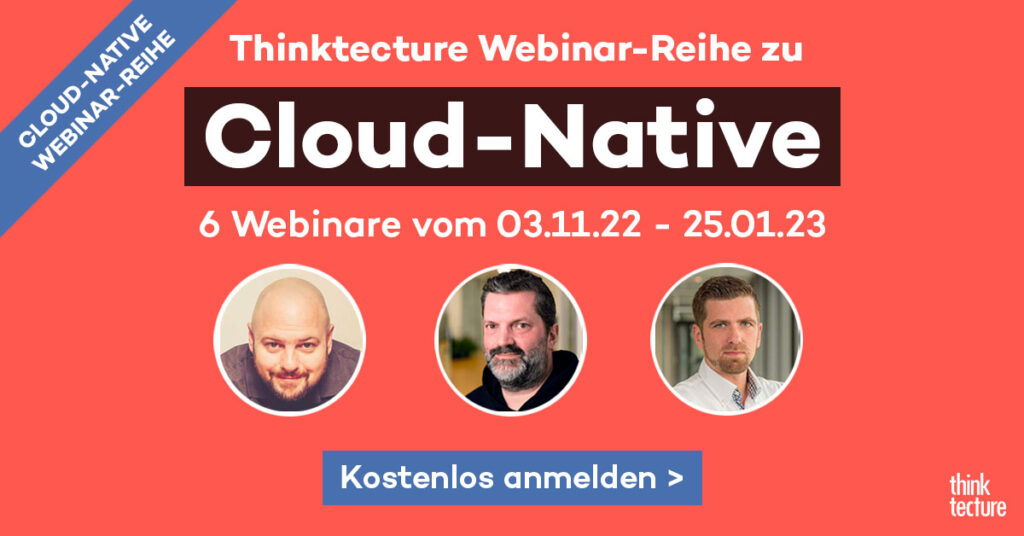- 10:30 Uhr
- Christian Weyer
Webinar: Cloud-Native: Angewandte Patterns & Praktiken – mit Dapr
Cloud-Native-Anwendungen bestehen meist aus mehr als einem Service. Die Herausforderung, zentrale Attribute wie Konfigurierbarkeit, Robustheit, Skalierbarkeit oder Überwachbarkeit in einer mehrere Bestandteile umfassenden verteilten Architektur umzusetzen, darf nicht unterschätzt werden.
Christian Weyer zeigt in diesem Webinar pragmatische Wege, welche Architektur-Patterns wann und wie für welche Attribute Sinn machen. Damit es nicht zu trocken wird, setzt er die Patterns in einer Beispielanwendung mit C# & .NET (und ein bisschen GoLang) durch die Nutzung von Dapr (Distributed Applications Runtime) um. Dapr implementiert durch sogenannte Building Blocks und Components eine Vielzahl erprobter Patterns und Praktiken für Cloud-Native-Applikationen und stellt sie Entwicklern für alle möglichen Programmiersprachen und Plattformen zur Verfügung.
Dieses Webinar ist Teil unserer Cloud-Native Webinar-Reihe
Unsere erfahrenen Spezialisten Boris Wilhelms, Christian Weyer & Thorsten Hans betrachten das Thema Cloud-Native auf pragmatische Weise. Hier finden Sie alle Webinare.

Moderation

Gøran Homberg
Gøran Homberg ist Consultant bei Thinktecture und arbeitet mit unseren Kunden bzgl. deren Anforderungen, Projektansätzen und zugehörigem Projekt-Management.
Agenda
- Bestimmte Cloud-Native-Attribute über Architektur-Patterns umsetzen
- Dapr als Cloud-Native-Laufzeitumgebung und API
- Erprobte Patterns & Praktiken über Dapr nutzen
- Beispiel-Code in .NET - Dapr unterstützt aber viele Sprachen & Plattformen
Material & Video zu "Cloud-Native: Angewandte Patterns & Praktiken – mit Dapr"
Sie wünschen sich Unterstützung durch unsere Experten in Ihrem Projekt?
Slidedeck zu "Cloud-Native: Angewandte Patterns & Praktiken – mit Dapr"
Kommende Webinare: jetzt kostenlos anmelden
No results found.
Hallo, .NET Developer!
Du begeisterst Dich für .NET-basierte Cloud-Native-Lösungen?
Du möchtest, dass Deine Expertise zum Einsatz kommt und von einer Expertenschaft gechallenged wird? Du weißt, dass nur durch Research auch während der Arbeitszeit neue Technologien erlernbar sind und erst damit Innovation möglich wird?
Erfahre hier mehr über uns als Team und was Dich bei uns erwartet.
Aktuelle Webinar-Aufzeichnungen
Christian Liebel | 14.05.2025 | 10:30 Uhr
Daniel Sogl | 30.04.2025 | 10:30 Uhr
Weitere Artikel zu .NET Core, ASP.NET Core, C#, Cloud-Native, Dapr


Discriminated Unions in .NET: Integration with Frameworks and Libraries


Advanced Value Object Patterns in .NET


Discriminated Unions in .NET: Modeling States and Variants


Smart Enums in .NET: Integration with Frameworks and Libraries


Value Objects in .NET: Enhancing Business Semantics





